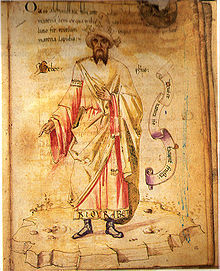
Jabir Ibn Hayyan- (Known as Geber in the west) FATHER OF CHEMISTRY
Born in Iran 721 A.D, Jabir Ibn Hayyan was one of the first Alchemists of the medieval times.
Jābir’s alchemical investigations ostensibly revolved around the ultimate goal of takwin — the artificial creation of life. The Book of Stones includes several recipes for creating creatures such as scorpions and snakes in a laboratory environment, which are subject to the control of their creator.
What Jābir meant by these recipes is unknown.
His name was to become the most famous in alchemy. He paved the way for most of the later alchemists, including al-Kindi, al-Razi, al-Tughrai and al-Iraqi, who lived in the 9th-13th centuries.
His books strongly influenced the medieval European alchemists and justified their search for the philosopher’s stone. In the Middle Ages, Jabir’s treatises on alchemy were translated into Latin and became standard texts for European alchemists. These include the Kitab al-Kimya (titled Book of the Composition of Alchemy in Europe), translated by Robert of Chester (1144); and the Kitab al-Sab’een (Book of Seventy) by Gerard of Cremona (before 1187). Marcelin Berthelot translated some of his books under the fanciful titles Book of the Kingdom, Book of the Balances, and Book of Eastern Mercury. Several technical Arabic terms introduced by Jabir, such as alkali, have found their way into various European languages and have become part of scientific vocabulary.
The historian of chemistry Erick John gives credit to Jābir for developing alchemy into an experimental science and he writes that Jābir’s importance to the history of chemistry is equal to that of Robert Boyle and Antoine Lavoisier.
The term ‘gibberish’ was referred to his writings, as he wrote his books in the most discreet code language.
sumber dari: http://centralscience.tumblr.com/
No comments:
Post a Comment